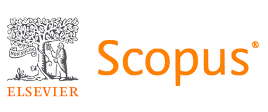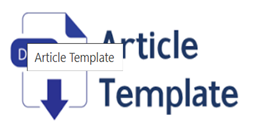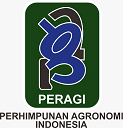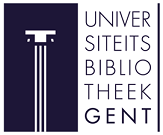Community Synergy for Clean Rivers: A Case Study on Household Waste Management in Rural Areas
Abstract
Effective waste management is a crucial responsibility of the government to protect the environment and public health. Failure in waste management, particularly in densely populated and flood-prone areas, can lead to environmental disasters such as river sedimentation and major flooding. This study aims to analyze the perceptions of the Pungpungan Village community regarding household waste management along the riverbanks and to formulate an ideal and sustainable management strategy. The research method used was descriptive qualitative. The total sample for this study comprised 40 households, which were selected through simple random sampling. In addition, purposive sampling was applied based on specific criteria to select samples according to the community's background and role. The primary data collection techniques in this study included interviews and observations. For secondary data, the research relied on literature reviews and documents, including those from the Pungpungan Village Government Office and library studies. The data analysis in this study employed SWOT analysis. The results indicate that although the community has good knowledge of the 3R concept (reduce, reuse, recycle) and the negative impacts of improper waste disposal, the practice of transforming waste into economically valuable products remains limited. The ideal strategy involves increasing education, providing infrastructure, and enforcing sanitation regulations to achieve sustainable waste management. The implications of this study suggest that a participatory approach, coupled with adequate infrastructure support facilitated by the village government, can significantly enhance the effectiveness of household waste management and encourage more sustainable behavioral changes in rural communities.
Keywords
Full Text:
PDFReferences
Abraham, C. M. (2022). Assessment of Community Resilience and Environmental Casualties in a Flood Prone Terrain of Uyo Urban, Akwa Ibom State, Nigeria. Ibom Journal of Social Issues, 11(1), 48–59. https://doi.org/10.36108/ijsi/2202.11.0160
Afshar, F., Abbaspour, M., & Lahijanian, A. A. M. (2019). Providing a practical model of the waste management master plan with emphasis on public participation using the SWOT method, the QSPM matrix and the FAHP method. Advances in Environmental Technology, 5(2), 77–96. https://doi.org/10.22104/aet.2020.3990.1200
Ahmad. (2020). Manajemen Strategis. Nas Media Pustaka.
Astuti, H. W., Meidiana, C., & Wijayanti, W. P. (2020). Evaluasi pelaksanaan Bank sampah di Kecamatan Junrejo Kota Batu. Planning for Urban and Environment Journal, 9(2), 29–38. https://purejournal.ub.ac.id/index.php/pure/article/view/107/76
Awino, F. B., & Apitz, S. E. (2024). Solid waste management in the context of the waste hierarchy and circular economy frameworks: An international critical review. Integrated Environmental Assessment and Management, 20(1), 9–35. https://doi.org/10.1002/ieam.4774
Bansal, P., Gualandris, J., & Kim, N. (2020). Theorizing Supply Chains with Qualitative Big Data and Topic Modeling. Journal of Supply Chain Management, 56(2), 7–18. https://doi.org/10.1111/jscm.12224
Brotosusilo, A., Nabila, S. H., Negoro, H. A., & Utari, D. (2020). The level of individual participation of community in implementing effective solid waste management policies. Global Journal of Environmental Science and Management, 6(3), 341–354. https://doi.org/10.22034/gjesm.2020.03.05
Caferra, R., Colasante, A., D’Adamo, I., Yilan, G., & Lancialonga, D. (2024). A strategic analysis of renewable energy communities in achieving sustainable development. Utilities Policy, 90(1), 1–11. https://doi.org/10.1016/j.jup.2024.101810
Creswell, J. W. (2008). Educational Research: Planning, Conducting and Evaluating, Quantitative and Qualitative Research (3rd ed.). Pearson Education.
David, V. E., John, Y., & Hussain, S. (2020). Rethinking sustainability: a review of Liberia’s municipal solid waste management systems, status, and challenges. Journal of Material Cycles and Waste Management, 22(5), 1299–1317. https://doi.org/10.1007/s10163-020-01046-x
Elliott, R. (2019). ‘Scarier than another storm’: values at risk in the mapping and insuring of US floodplains. British Journal of Sociology, 70(3), 1067–1090. https://doi.org/10.1111/1468-4446.12381
Fadhullah, W., Imran, N. I. N., Ismail, S. N. S., Jaafar, M. H., & Abdullah, H. (2022). Household solid waste management practices and perceptions among residents in the East Coast of Malaysia. BMC Public Health, 22(1), 1–20. https://doi.org/10.1186/s12889-021-12274-7
Grangxabe, X. S., Maphanga, T., Madonsela, B. S., Gqomfa, B., Phungela, T. T., Malakane, K. C., Thamaga, K. H., & Angwenyi, D. (2023). The Escalation of Informal Settlement and the High Levels of Illegal Dumping Post-Apartheid: Systematic Review. Challenges, 14(3), 38. https://doi.org/10.3390/challe14030038
He, Y., Zaremohzzabieh, Z., Rahman, H. A., Ismail, S. N. S., & Bin-Qiang, J. (2024). Applying participatory research in solid waste management: A systematic literature review and evaluation reporting. Journal of Infrastructure, Policy and Development, 8(5), 1–28. https://doi.org/10.24294/jipd.v8i5.5072
Hoang Tien, N., Thi Thuy Trang, T., Lieng Diem, D., & Bich Ngoc, P. (2021). Development of Tourism in South Central Coastal Provinces of Vietnam. Journal of Archaeology of Egypt/Egyptology, 18(8), 1408–1427.
https://archives.palarch.nl/index.php/jae/article/view/8944/8313
Ibrahim, M., & Tasi’u, Y. R. (2020). Effects of Flood on Environmental Quality in Ringim, Jigawa State, Northern Nigeria. International Journal of Science for Global Sustainability, 6(3), 33–43.
Ikram, M., Sroufe, R., Awan, U., & Abid, N. (2022). Enabling progress in developing economies: A novel hybrid decision-making model for green technology planning. Sustainability (Switzerland), 14(1), 1–30. https://doi.org/10.3390/su14010258
Irawan, D. S., Sari, D. A. P., & Putriahalya, R. A. A. (2021). Study of The Carrying Capacity of The Environment Case Study: The Simanindo Area, Samosir Regency, North Sumatra. Agro Bali: Agricultural Journal, 4(1), 72–86. https://doi.org/10.37637/ab.v4i1.688
Kalafat, E., Laoreti, A., Khalil, A., & Costa, F. D. S. (2018). Challenges for flood risk management in flood prone Sirajganj region of Bangladesh. Journal of Fish Biology, 1(51), 731–737.
Kurniawan, N. P., Purwanto, E., & Daryono, Z. N. A. (2022). Participatory Management of Bontang Mangrove Park East Kalimantan, Indonesia. Agro Bali : Agricultural Journal, 5(3), 443–453. https://doi.org/10.37637/ab.v5i3.977
Lestari, P. L., Afifah, Y. N., G, B. P., Lestariningsih, W., Puspita, A. D., Gunawan, E., & Choifin, M. (2020). Pengolahan metode 4R dan bank sampah untuk menjadikan lingkungan bersih, sehat dan ekonomis. Jurnal Pengabdian Masyarakat, 2(1), 1–6. https://e-journal.umaha.ac.id/among/article/view/587/444
Liu, C., Dou, X., Li, J., & Cai, L. A. (2020). Analyzing government role in rural tourism development: An empirical investigation from China. Journal of Rural Studies, 79(1), 177–188. https://doi.org/10.1016/j.jrurstud.2020.08.046
Marlia, M., Syaharuddin, S., Handy, M. R. N., Subiyakto, B., & Ilhami, M. R. (2022). Changes in the Behavior of the Riverside Community of Banua Anyar Village towards River Management Policies. The Kalimantan Social Studies Journal, 4(1), 1–48. https://doi.org/10.20527/kss.v4i1.5617
Michael Ayorinde Dada, Alexander Obaigbena, Michael Tega Majemite, Johnson Sunday Oliha, & Preye Winston Biu. (2024). Innovative Approaches To Waste Resource Management: Implications for Environmental Sustainability and Policy. Engineering Science & Technology Journal, 5(1), 115–127. https://doi.org/10.51594/estj.v5i1.731
Mihai, F. C., Gündogdu, S., Markley, L. A., Olivelli, A., Khan, F. R., Gwinnett, C., Gutberlet, J., Reyna-Bensusan, N., Llanquileo-Melgarejo, P., Meidiana, C., Elagroudy, S., Ishchenko, V., Penney, S., Lenkiewicz, Z., & Molinos-Senante, M. (2022). Plastic Pollution, Waste Management Issues, and Circular Economy Opportunities in Rural Communities. Sustainability (Switzerland), 14(1), 1–48. https://doi.org/10.3390/su14010020
Oktarini, M. F., Hapsari, H., & Triyuli, W. (2023). The Social and Cultural Aspects of Waste Disposal Management in the Planning Revitalization of Riverbank Settlement. Humaniora, 14(1), 31–38. https://doi.org/10.21512/humaniora.v14i1.7877
Olanrewaju, C. C., Chitakira, M., Olanrewaju, O. A., & Louw, E. (2019). Impacts of flood disasters in Nigeria: A critical evaluation of health implications and management. Jamba: Journal of Disaster Risk Studies, 11(1), 1–9. https://doi.org/10.4102/jamba.v11i1.557
Olivo, V. E., Prietto, P. D. M., & Korf, E. P. (2021). Actions and policy tools for local governments to achieve integrated sustainable waste management. Revista Brasileira de Ciências Ambientais, 56(3), 436–444. https://doi.org/10.5327/z21769478968
Olukanni, D. O., & Nwafor, C. O. (2019). Public-private sector involvement in providing efficient solid waste management services in Nigeria. Recycling, 4(2), 1–9. https://doi.org/10.3390/recycling4020019
Rahmasary, A. N., Robert, S., Chang, I. S., Jing, W., Park, J., Bluemling, B., Koop, S., & van Leeuwen, K. (2019). Overcoming the Challenges of Water, Waste and Climate Change in Asian Cities. Environmental Management, 63(4), 520–535. https://doi.org/10.1007/s00267-019-01137-y
Rangkuti, F. (2018). Analisis SWOT : Teknik membedah kasus bisnis cara perhitungan bobot, rating, dan OCAI. Gramedia.
Sari, Y. M. N., & Hardianti. (2019). Analisis Swot Untuk Menentukan Strategi Perushaan (Studi Pada Warung Serba Ada(Waserda) Koperasi Unit Desa Pakis). Jiagabi, 8(3), 220–229.
Siombo, M. R. (2022). Penyuluhan Hukum Menjadikan Sampah Sebagai Sumberdaya pada Bank Sampah Mustika Jaya. Indonesian Journal Of Legal Community Engagement, 5(2), 159–174.
Siregar, I., & Zulkarnain. (2021). British Journal of Environmental Studies CSR-Based Corporate Environmental Policy Implementation. British Journal of Environmental Studies, 1(1), 51–57. https://doi.org/10.32996/bjes
Squire, J. N. T., & Nkurunziza, J. (2022). Urban Waste Management in Post-Genocide Rwanda: An Empirical Survey of the City of Kigali. Journal of Asian and African Studies, 57(4), 760–772. https://doi.org/10.1177/00219096211035430
Sugiyono. (2019). Metode Penelitian Kuantitatif, Kualitatif, dan R&D. Alphabet.
Surya, B., Syafri, S., Sahban, H., & Sakti, H. H. (2020). Natural resource conservation based on community economic empowerment: Perspectives on watershed management and slum settlements in Makassar City, South Sulawesi, Indonesia. Land, 9(4), 1–31. https://doi.org/10.3390/land9040104
Syafri, S., Surya, B., Ridwan, R., Bahri, S., Rasyidi, E. S., & Sudarman, S. (2020). Water quality pollution control and watershed management based on community participation in maros city, south sulawesi, indonesia. Sustainability (Switzerland), 12(24), 1–38. https://doi.org/10.3390/su122410260
Szupszynski, K. P. D. R. (2021). The Transtheoretical Model of Behavior Change: Prochaska and DiClemente’s Model. In Psychology of Substance Abuse (pp. 205–215). Springer. https://doi.org/10.1007/978-3-030-62106-3
Wang, Z., Li, W., Li, Y., Qin, C., Lv, C., & Liu, Y. (2020). The “Three Lines One Permit” policy: An integrated environmental regulation in China. Resources, Conservation and Recycling, 163(1), 1–11. https://doi.org/10.1016/j.resconrec.2020.105101
Wantim, M. N., Zisuh, A. F., Tendong, N. S., Mbua, R. L., Findi, E. N., Ayonghe, S. N., Science, E., Management, D. R., & Wantim, M. (2021). Strategies and perceptions towards flood control and waste management in Limbe city, Cameroon. Jàmbá - Journal of Disaster Risk Studies, 1(1), 1–14. https://www.scielo.org.za/pdf/jamba/v15n1/25.pdf
Widaningsih, N. K. A., & Meitriana, M. A. (2022). Persepsi dan Partisipasi Masyarakat Terhadap Penerapan Program Bank Sampah Pertiwi Lestari di Desa Penyaringan. Ekuitas: Jurnal Pendidikan Ekonomi, 10(1), 115–121. https://ojs.unida.ac.id/JN/article/view/1899
Yuan, J., Xie, H., Yang, D., Xiahou, X., Skibniewski, M. J., & Huang, W. (2020). Strategy formulation for the sustainable development of smart cities: A case study of Nanjing, China. International Journal of Strategic Property Management, 26(4), 379–399. https://doi.org/10.3846/ijspm.2020.13345
Refbacks
- There are currently no refbacks.

























